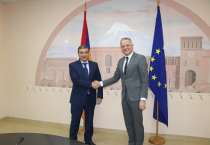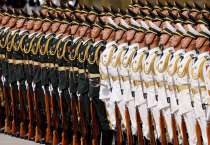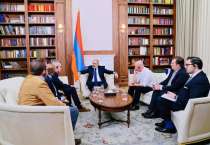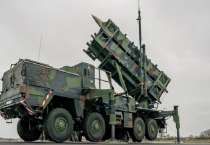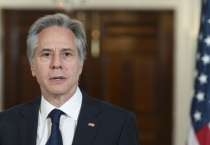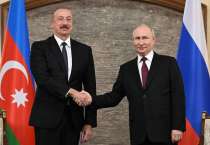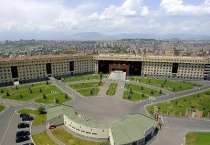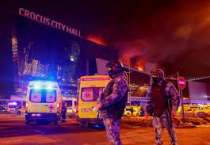What President of Azerbaijan calls its ‘patriotic war’, resulted in the complete ethnic cleansing of Nagorno-Karabakh, Pierre d'Argent
Political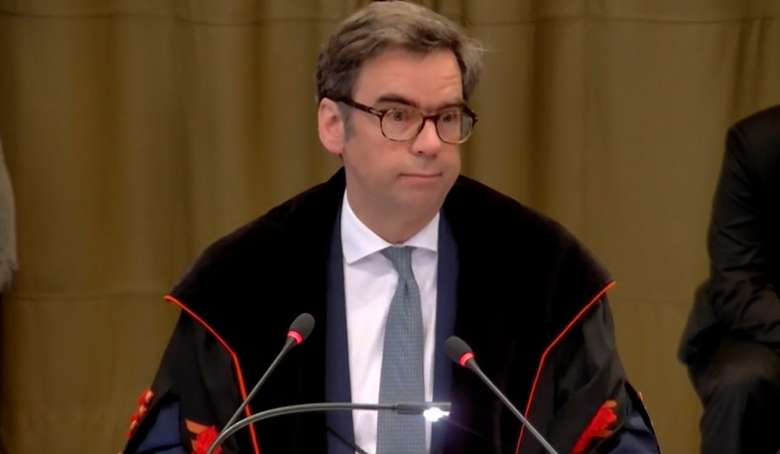
Prof. Pierre d'Argent delivered opening remarks during a hearing of Application of The International Convention on the Elimination of All Forms of Discrimination (Armenia V. Azerbaijan) in International Court Of Justice, The Hague, The Netherlands, on April 16, 2024. He spoke on it during oral proceedings on the preliminary objections raised by Azerbaijan.
D'Argent, in particular, said:
Mr President, Madam Vice-President, Ladies and Gentlemen, it is an honour to address the Court once again in support of Armenia.
As you heard yesterday, the second preliminary objection raised by Azerbaijan relates to the Court's subject-matter jurisdiction under the 1965 Convention.
First of all, I will try to define precisely the purpose of this second preliminary exception because it does not apply to all of Armenia's submissions and, as you know, it has been amended recently. Secondly, I will return briefly to the context of the claims before you, which is absolutely crucial to a proper understanding of this exception. Finally, as an introduction to the presentations by my colleagues who will follow me on the stand, I will briefly outline the principles governing the Court's substantive jurisdiction and examine their application in the light of the Convention.
The scope of the second preliminary objection and claims not covered by it.
Mr President, as amended, Azerbaijan's second preliminary objection seeks to exclude from the debate on the merits only certain allegations of violation of the Convention made by Armenia, namely :
Allegations of arbitrary detentions of ethnic Armenians ;
Allegations of enforced disappearances of ethnic Armenians ;
Lastly, Armenia's claims relating to various acts of violence committed against ethnic Armenians. As you know, Azerbaijan's position has apparently changed in the course of the proceedings. The question is, however, whether it has really evolved, as it is difficult to know what has changed.
Azerbaijan initially argued that all acts of physical violence directed against ethnic Armenians, whether members of the armed forces or civilians, were excluded from the material scope of the Convention if they had occurred during the armed conflict or in connection with the crossing of borders . On 5 April, Azerbaijan indicated that it no longer objected to the Court's jurisdiction over Armenia's claims relating to the "mistreatment of ethnic Armenian civilians during armed conflict", while adding that it maintained its objection to the "remainder of Armenia's CERD claims related to alleged mistreatment of civilians during the active hostilities phase of armed conflict, in relation to which Armenia has presented no specific evidence of purported misconduct on the basis of ethnic or national origin". Azerbaijan also maintained its objection to the "claims related to alleged mistreatment of Armenia's armed forces during the active hostilities phase of armed conflict".
However, the precise contours of what remains of Azerbaijan's preliminary objection in this respect are very unclear. It is very difficult to identify which of Armenia's requests relating to abuses committed against civilians are no longer covered by the preliminary objection. Azerbaijan's letter of 5 April suggests that a distinction should be made between abuses suffered by ethnic Armenian civilians "during armed conflict" and those that took place "during the active phase of hostilities of armed conflict", but yesterday's oral pleadings shed no light on this issue. Azerbaijan did provide some temporal details of what it considers to be the various active phases of hostilities between the Parties. However, if this criterion is relevant, it is difficult to understand why it maintains its objection in respect of arbitrary detentions and enforced disappearances that took place outside the active phases of hostilities. Furthermore, what is meant by "Armenia's armed forces"? Is there a difference with "Armenian military personnel" or with "Armenia's Armed Forces personnel", given that there are civilian personnel in all the armed forces? Azerbaijan refers even more broadly to "combatants in the active hostilities phase of an armed conflict" . The formula undoubtedly includes members of the armed forces of the Republic of Armenia, but does it also cover civilians from Nagorno-Karabakh who have joined the ranks of the army of the pro-independence authorities? Perhaps the second round will clear up these questions and finally identify with certainty Armenia's claims relating to the abuses suffered by ethnic Armenians in respect of which Azerbaijan accepts your jurisdiction.
In any event, Azerbaijan's objection ratione materiae never concerned a considerable number of Armenian applications. These are set out in the list appearing on your screen.
Although Azerbaijan's second preliminary objection concerns a set of facts that occurred during or as a result of hostilities between the Parties, or during their "active phase", the applicability in principle of the Convention in time of armed conflict is not contested by the Respondent. This is an important element of convergence between the Parties to which Professor Murphy will return.
Immediately after making this concession of principle, Azerbaijan nevertheless contended that certain events which occurred on the occasion of or as a result of the hostilities, or during their "active phase", were in no way liable to engage its responsibility under the Convention. According to Azerbaijan, certain acts connected with the hostilities of which Armenia complains and in respect of which the preliminary objection is not withdrawn, would not be liable to be discriminatory under the Convention, essentially but not exclusively, having regard to the time at which they took place-the active or non-active phase of hostilities-or to the status of the victims-civilians or military personnel. According to Azerbaijan, to decide otherwise would be tantamount to transforming any armed conflict between States into a conflict covered by the Convention, since it is not unusual for wars to pit peoples of different ethnic origins against each other.
II. A conflict with very marked ethnic origins and dimensions.
Mr President, ladies and gentlemen of the Court, the distinctions Azerbaijan is making are irrelevant and meaningless under the Convention, and all the more so because there is no doubt that the conflict between Azerbaijan and the ethnic Armenians when they lived in Nagorno-Karabakh had very marked ethnic origins and dimensions . Azerbaijan yesterday acknowledged that the conflict before the Court is an "ethnic conflict". Thus, this conflict is not an ordinary inter-State war, contrary to what, in a perfectly contradictory and decontextualised manner, Azerbaijan is trying to convince you by claiming that within this conflict there are particularly cruel and shocking acts of violence which have nothing to do with the ethnic origin of their victims.
This conflict is an ethnic conflict because for three decades, under the pretext of territorial integrity, Azerbaijan refused to accept the self-determination of the Armenians living on their ancestral lands in Nagorno-Karabakh. This conflict was-and still is-ethnically motivated and discriminatory, just as Azerbaijan's decision to put an end to this self-determination through its military operations in 2020 and, ultimately, in September 2023, was ethnically motivated and discriminatory. What Azerbaijan, through the voice of its President, calls its "war of liberation", or its "patriotic war", involved numerous discriminatory violations of the fundamental rights of ethnic Armenians, including when they took part in the hostilities. Moreover, this war resulted in the complete ethnic cleansing of Nagorno-Karabakh in defiance of the Court's orders, which were intended to protect plausible Convention rights that were under serious threat. According to its own national narrative, Azerbaijan thus "liberated" itself by waging war at the end of 2020, and then - after a complete ceasefire - by pursuing its objectives through the gradual strangulation of Nagorno-Karabakh, right up to the final coup de force in September 2023 by which the ethnic Armenian inhabitants of Nagorno-Karabakh were driven out. Thus, for Azerbaijan, its "liberation" involved the rejection of any autonomy for ethnic Armenians and, ultimately, their forced exclusion from their ancestral lands, which is consolidated by the denial, destruction or alteration of any trace of the centuries-old Armenian presence in this territory. This, ladies and gentlemen of the Court, is the objective and the fruit of Azerbaijan's "patriotic war": a homeland without ethnic Armenians.
Ladies and Gentlemen of the Court: do we need to say more? Is it necessary to say more, not only about the context of the dispute which Armenia has submitted to the Court, but about its very subject-matter, which clearly falls within the scope of the Convention, and this from the point of view of all the Armenian applications? Indeed, all the Armenian applications, including those that Azerbaijan intends to exclude by its second preliminary objection as amended, concern violations of fundamental human rights specifically targeting individuals on account of their Armenian national or ethnic origin, and not on account of their nationality or any other ground not provided for in the Convention.
I could no doubt end my argument here without adding that it is the same obstinate refusal by Azerbaijan to see the discriminatory evidence at the heart of its political-military project and its actions that necessarily precipitated the failure of the pre-litigation negotiations between the Parties. In this sense, it is sufficient to take the measure of Azerbaijan's second preliminary objection in order to reject the first, if one were not already convinced of its total lack of foundation, as demonstrated by Mr Salonidis.
III. The conditions governing the Court's subject-matter jurisdiction and their application in relation to the Convention.
Mr President: Azerbaijan's second preliminary objection is not only absurd in the light of the well-known general context in which all the events complained of by Armenia took place and the subject-matter of the dispute before the Court, but it is also erroneous in the light of the conditions governing the Court's jurisdiction ratione materiae.
These conditions are well known:
"It is a question of determining whether the actions or omissions of which the plaintiff complains to the defendant fall within the scope of the treaty alleged to have been breached, i.e. whether the facts in question, assuming that they have been established, are likely to constitute breaches of the obligations arising from the treaty.
"it must be ascertained whether the actions or omissions of the respondent complained of by the applicant fall within the scope of the treaty allegedly violated, in other words whether the facts at issue, if established, are capable of constituting violations of obligations under the treaty”.
At this stage, two things are essential:
On the one hand, there is "no need to satisfy itself that the measures of which [the applicant] complains actually constitute 'racial discrimination' within the meaning of Article 1, paragraph 1, of [the Convention]". [no[] need to satisfy itself that the measures of which [the applicant] complains actually constitute 'racial discrimination' within the meaning of Article 1, paragraph 1, of [the Convention]".
On the other hand, the facts of the case must be taken as they are, on the assumption that they have been established. There is therefore no question, at this stage, of evaluating the evidence submitted to you or requiring additional evidence. It is therefore wholly inappropriate at this stage to venture into linguistic exegesis or to assess the meaning of certain statements, as Mr Wordsworth did yesterday. It is equally wrong to argue that Armenia has not "provided sufficient evidence" at this stage, as it is impossible to reach such a conclusion without assessing that evidence, which can only be done during the examination of the merits. Any assertion as to what can or cannot be established on the basis of the evidence submitted by Armenia is therefore inappropriate at this stage.
As I have already emphasised, Azerbaijan submits that any differences in treatment complained of by Armenia and which are the subject of its second preliminary objection are not likely to be "based on" "race, colour, descent, or national or ethnic origin".
However, it is not disputed that ethnic Armenians are a protected group under the Convention. Moreover, it is clear that among the "specific obligations in relation to the treatment of individuals on the basis of 'race, colour, descent, or national or ethnic origin'"] Article 5 of the Convention includes the obligation to ensure, without prohibited discrimination, the enjoyment of "the right to security of person and protection by the State against violence or bodily harm, whether inflicted by government officials de tout individu, groupe ou institution" ["right to security of person and protection by the State against violence or bodily harm, whether inflicted by government officials or by any individual group or institution"] and also the obligation to ensure, without prohibited discrimination, the enjoyment of the "right to equal treatment before the tribunals and all other organs administering justice".
As my colleagues will show, the abuses of which Armenia complains and which Azerbaijan seeks to exclude from the debate on the merits by its second preliminary objection relate to the treatment inflicted by Azerbaijan on persons of Armenian national or ethnic origin in breach of these and other obligations contained in the Convention, including where those ethnic Armenians took an active part in the hostilities.
Applying the same reasoning as that of the Court in the judgment of 8 November 2019 in Ukraine v. Russian Federation, it must therefore be concluded that the measures complained of by Armenia "are capable of having an adverse effect on the enjoyment of certain rights protected under CERD" and, accordingly, that they "fall within the provisions of the Convention".
Azerbaijan maintains, however, that the circumstances of armed hostilities constituting the context in which the events complained of by Armenia occurred would necessarily imply that the differences in treatment in question could in no way be based on the Armenian ethnic origin of the victims, so as to fall outside the scope of the Convention. According to Azerbaijan, as soon as the violations complained of took place during the active phase of an armed conflict, a form of reversal of the evidence would take place, since it would then have to be shown that the abuses could not be explained by those circumstances, so that "something more" would have to be proved.
Azerbaijan's position is wrong for three reasons.
Firstly, this position is based on the principle that since international humanitarian law applies in times of armed conflict, violations of the Convention could only be additional, as it were secondary, to violations of the law of armed conflict. This view is erroneous because both sets of rules apply simultaneously when their respective conditions of application are met. Contrary to what was argued yesterday, Armenia is not making any "claims under international humanitarian law" to which claims under the Convention would be added. And Armenia's requests under the Convention in no way replaced the requests it should have made under international humanitarian law, as Azerbaijan implied. International humanitarian law does not protect against racial discrimination. Furthermore, I would point out that at this stage, it is only a question of examining whether Armenia's requests are likely to fall within the scope of the Convention, as defined by Article 1er , and not of coming to a definitive conclusion as to whether or not practices of racial discrimination exist.
Secondly, even if, quod non, the differences in treatment complained of by Armenia could, moreover, also be explained by grounds not provided for in the Convention or by certain circumstances, that would not take them outside its scope. Indeed, there is nothing in the text of Article 1er , paragraph 1, of the Convention to indicate that, for discrimination to be based on a prohibited ground, that ground must be the only one that motivated it or is likely to explain it. Such a view would considerably reduce the scope of the Convention, thereby contradicting its object and purpose of "speedily eliminating racial discrimination throughout the world in all its forms and manifestations" . Of course, as the Court has emphasised and as the Parties agree , the Convention does not prohibit any ground of discrimination other than "race, colour, descent, or national or ethnic origin", but to consider that grounds which it does not provide for may, in the same difference of treatment, coexist with grounds which it prohibits, is in no way to establish an additional ground of discrimination under the Convention. Moreover, in many cases, a discriminatory measure based on a prohibited ground will also pursue other grounds, which does not mean that it falls outside the scope of the Convention. The Committee says nothing else in its General Recommendation No. 32, stressing that there may be "situations of double or multiple discrimination-such as discrimination based on sex or religion [grounds not prohibited by the Convention] when combined with discrimination based on one or more of the grounds enumerated in Article 1 of the Convention". [situations of double or multiple discrimination - such as discrimination on grounds of gender or religion [grounds not prohibited by the Convention] - when discrimination on such a ground appears to exist in combination with a ground or grounds listed in article 1 of the Convention"]. Armenia does not read the General Recommendation as extending the prohibited grounds of discrimination under the Convention.
The Court's most recent case law confirms this point of law. In its judgment of 31 January this year, the Court recalled that "[a]ny measure whose purpose is a differentiation of treatment based on a ground prohibited under Article 1, paragraph 1, constitutes an act of racial discrimination under the Convention". Thus, on the merits, the Court in no way required that the difference in treatment sought be based exclusively on a prohibited ground. In the present case, it is undeniable that the aim of the differences in treatment complained of is perfectly likely not to be "unrelated to" a ground prohibited by the Convention.
Lastly, and precisely on this point, Azerbaijan was mistaken in maintaining that a particular and additional burden of proof would be imposed on Armenia, and that it had not met it, since the issue in the present case was at most one of "mere collateral or secondary effects on persons distinguished on the basis of one of the prohibited grounds" and that it was well established that such effects "do not in themselves give rise to racial discrimination within the meaning of the Convention". Azerbaijan was mistaken because this question only arises in the case of indirect discrimination, i.e. discrimination prohibited by the Convention on the basis of its effects. But Armenia has submitted another case to the Court, a case of direct discrimination. As my colleagues will show, the facts presented by Armenia - facts which the Court must at this stage assume to be established - are perfectly likely to fall within the scope of the Convention, and this from the point of view of direct discrimination, i.e. discrimination arising from a measure effecting a difference in treatment the stated aim of which is based on a prohibited ground.
Ladies and Gentlemen, the criteria for your jurisdiction ratione materiae are clear and perfectly met.





 35 border posts installed on Armenia-Azerbaijan border
35 border posts installed on Armenia-Azerbaijan border Kazakhstan to not act as mediator in Armenia, Azerbaijan FMs' meeting
Kazakhstan to not act as mediator in Armenia, Azerbaijan FMs' meeting Foreign Ministers of Armenia and Azerbaijan to meet in Almaty
Foreign Ministers of Armenia and Azerbaijan to meet in Almaty Dina Titus submits bill on sanctions against Azerbaijan to US Congress
Dina Titus submits bill on sanctions against Azerbaijan to US Congress MFA spox: Armenia received Azerbaijan proposals regarding ‘peace treaty’ draft
MFA spox: Armenia received Azerbaijan proposals regarding ‘peace treaty’ draft Russia MP: I’m ashamed of my colleagues' assessments of events in Karabakh
Russia MP: I’m ashamed of my colleagues' assessments of events in Karabakh Baku described resolution of European Parliament related to human rights in Azerbaijan as 'one-sided and groundless'
Baku described resolution of European Parliament related to human rights in Azerbaijan as 'one-sided and groundless' Joint Russia-Turkey monitoring center closing in Karabakh
Joint Russia-Turkey monitoring center closing in Karabakh At suggestion of Kazakh side, we will inform about date of possible meeting of Foreign Ministers of Armenia and Azerbaijan: Ani Badalyan
At suggestion of Kazakh side, we will inform about date of possible meeting of Foreign Ministers of Armenia and Azerbaijan: Ani Badalyan Mher Grigoryan, Iran envoy discuss latest developments in Armenia-Azerbaijan state border delimitation
Mher Grigoryan, Iran envoy discuss latest developments in Armenia-Azerbaijan state border delimitation


















































 Most Popular
Most Popular 
 Cyberattack forces Georgia county to sever connection to state voter registration system
Cyberattack forces Georgia county to sever connection to state voter registration system